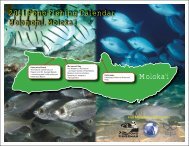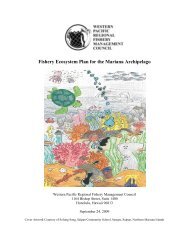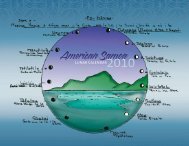Shark Depredation and Unwanted Bycatch in Pelagic Longline
Shark Depredation and Unwanted Bycatch in Pelagic Longline
Shark Depredation and Unwanted Bycatch in Pelagic Longline
Create successful ePaper yourself
Turn your PDF publications into a flip-book with our unique Google optimized e-Paper software.
South Africa <strong>Pelagic</strong> Longl<strong>in</strong>e Tuna <strong>and</strong> Swordfish Fishery<br />
Fig. A7.5: Distribution of sets on which Blue <strong>Shark</strong>s were caught, 2000-2003.<br />
Fig. A7.4: Seasonal distribution of shark bycatch catch rates (note different<br />
scales on y-axis).<br />
Fig. A7.6. Distribution of sets on which Mako <strong>Shark</strong>s were caught, 2000-2003.<br />
A7.9. Methods for Onboard Process<strong>in</strong>g of Reta<strong>in</strong>ed<br />
<strong>Shark</strong>s<br />
There are two common methods for onboard process<strong>in</strong>g of reta<strong>in</strong>ed<br />
sharks by vessels <strong>in</strong> the domestic South Africa longl<strong>in</strong>e fishery:<br />
(i) Reta<strong>in</strong><strong>in</strong>g the body, f<strong>in</strong> the shark <strong>and</strong> discard the rest; <strong>and</strong> (ii)<br />
reta<strong>in</strong><strong>in</strong>g the whole body. Foreign licensed vessels generally reta<strong>in</strong><br />
f<strong>in</strong>s <strong>and</strong> trunks, <strong>and</strong> discard heads <strong>and</strong> guts of sharks.<br />
A7.10. <strong>Shark</strong> <strong>Depredation</strong> <strong>and</strong> Gear Damage<br />
For most, shark damage to their gear is a concern <strong>and</strong> estimated<br />
about at R5000 (approximately 750 US$) per set rang<strong>in</strong>g from R100<br />
to R10 000 (150-1500 US$) per set. This cost is ma<strong>in</strong>ly a comb<strong>in</strong>ation<br />
of time loss <strong>and</strong> gear costs. Some of the skippers refer to the high cost<br />
of bait that is taken by sharks <strong>and</strong> some refer to the time of h<strong>and</strong>l<strong>in</strong>g<br />
the shark on board to reta<strong>in</strong> the hooks. They typically loose between<br />
10 to 30 hooks or branchl<strong>in</strong>es per set. Although this varies greatly<br />
from set to set. Approximately 2 to 5 (one skipper reported up to 15<br />
per set) fish are typically damaged or lost to sharks on a typical set.<br />
They feel that they can tell shark damage from cetacean damage by<br />
the follow<strong>in</strong>g: killer whales usually leaves the head <strong>and</strong> the bite mark<br />
is jaggered whereas sharks bites the tail <strong>and</strong> the bite is clean. Blue <strong>and</strong><br />
short-f<strong>in</strong> makos are the most destructive sharks, but they are also the<br />
most commonly species caught. Most (one disagreed) felt that high<br />
shark catches reduced the catch rate of the target species.<br />
Some felt that they wanted to decrease their shark capture because<br />
they damage their gear <strong>and</strong> waste their time, others are <strong>in</strong>terested<br />
<strong>in</strong> catch<strong>in</strong>g anyth<strong>in</strong>g as long as it <strong>in</strong>creases their profit. They would<br />
all like to decrease shark depredation although they feel cetacean<br />
depredation is a far bigger problem.<br />
A7.11. Practices Employed to Reduce <strong>Shark</strong> Capture<br />
All skippers <strong>in</strong>terviewed say that they would avoid shark capture<br />
altogether if they could as a result of the current regulations. However,<br />
if they were free to f<strong>in</strong> or reta<strong>in</strong> as many sharks as they like, half<br />
said that they would not avoid catch<strong>in</strong>g sharks. Under this scenario<br />
shark capture would be an economic advantage. Two felt that the<br />
economic value of their shark catches is so low that it wouldn’t make<br />
a difference. One skipper said that he would prefer to avoid catch<strong>in</strong>g<br />
sharks as their target catch was more economically advantageous.<br />
Most felt that regulations did not give them a greater <strong>in</strong>centive to<br />
avoid shark capture. When asked how they would avoid shark capture<br />
119












